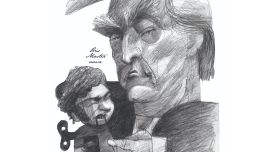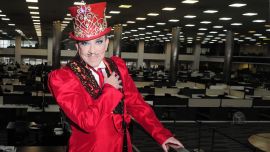Following presidential orders that classroom education return, regardless of the pandemic in order to deprive the opposition of a powerful electoral argument, Education Minister Nicolás Trotta confirmed last weekend that "school classes will return to the City of Buenos Aires on February 17 and to Buenos Aires Province on March 1" with all other provinces following by March 15.
"It will be a very careful return with all the protocols and precautions against the situation we are all aware of," Trotta told Radio Mitre from the province of La Rioja, adding: "The important thing we want to make clear is that the classes will begin, maximising classroom presence in line with the epidemiological reality of each district but we have to succeed, and that is our commitment, in making classroom presence again the hub of our entire educational system, prioritising every decision which preserves the school and classroom presence."
Consulted about the reluctance of some teacher union leaders, the minister reiterated that every care would be taken, following all protocols, even anticipating that a rebound of the pandemic could lead to "short-term interruptions with set dates" but not indefinitely like last year.
But Ctera’s Alejandra Bonato compared a return to classrooms with clandestine parties as the height of irresponsibility.
The national government argues that the difference between this year and last is that since November the World Health Organisation has been recommending keeping schools open during the pandemic while international evidence has been accumulating to show that a return to classrooms is possible. But the decision hinges on votes – the government is no longer inclined to relinquish the banner of defending education to the Juntos por el Cambio opposition.
The President normally draws a positive balance of his handling of the pandemic during 2020 although he now recognises that the failure to return most pupils to their classrooms was not only sanitary (since they are a low risk group) but also political. For some weeks now the Casa Rosada does not feel accompanied by the citizenry while admitting that the opposition draws strength in calling for the school year to start in the classroom.
Cabinet Chief Santiago Cafiero was entrusted with the mission of transmitting to Trotta that there was no longer any scope for maintaining a solely virtual system while President Fernández himself began to talk with the provincial governors, who each set their own date for the start of the school year (between February 17 and March 15) but agreed on returning to classrooms with the necessary protocols.
The minister commenced an inland tour. In Salta, Jujuy, Tucumán, Santiago del Estero, Catamarca and La Rioja they all repeated the same – the school year must start in the classroom. When on Peronist turf, the official also transmits the message of the Casa Rosada.
“We cannot allow speculation with the return to classes while permitting the opposition to wave the banner of defending schooling when they destroyed education in recent years,” he told governors like Juan Luis Manzur (Tucumán), Raúl Jalil (Catamarca) and Ricardo Quintela (La Rioja), among others, asking them to wave that banner themselves.
Commenting on the initiative of ex-president Mauricio Macri in posting the text “Open the schools” on the social networks, a leading minister told PERFIL: “Perhaps we should have been firmer, saying that classes should start with more emphasis.”
The government does not want its vaccination plan to be intermingled with its negotiations with the unions.
“Vaccination is not an indispensable condition but it will help to boost the start of classes and intensify classroom presence in the weeks to come,” explained Trotta.
Nevertheless, the government has thought of bringing forward the vaccination of teachers. In the Health Ministry they assure that they could be inoculated with their first dose in early February if the vaccines arrive according to the national government’s timetable. The estimated target figure is close to 1.4 million, including 1.1 million who receive the incentive reserved for teachers plus some private teachers and other educational workers.
The Buenos Aires provincial government also estimates that it can vaccinate 400,000 educational workers, sitting down to negotiate with the teacher unions. Suteba leader Roberto Baradel repeatedly said last year that conditions did not permit a return to classrooms, announcing that teachers would only present themselves in school once vaccinated. The Axel Kicillof government has explained that this sector was always a priority. Since Baradel tested positive for Covid-19 late last year, only informal official contacts have been possible with him so far this year but in those conversations there were reportedly advances towards protocols without strong resistance this time, provincial government sources assure.
In the government this week they also spoke of the necessity not to nationalise the tussle between City Mayor Horacio Rodríguez Larreta and the teacher unions of his district.
“If the City of Buenos Aires continues its ferocious battle against the unions and cannot start classes, we must show how they can take off in the rest of the country. We are the government which restored collective bargaining to teachers. We always hold dialogue with the unions, we’re going to summon them in February to discuss pay and we will continue dialogue. The problem of education is not the unions. The problem is when politics turns it back on schools with conflicts and disinvestment, which is what happened during the Macri government,” Trotta told PERFIL in conclusion.
Nevertheless, despite the tension with the unions, City Hall insists on starting the school year in the classroom on February 17. Late last week the City Education Ministry met up with the teacher unions, the largest of which, UTE-CTERA, presented its doubts and even refused to return to classrooms with UTE leader Eduardo López previously stating that conditions did not permit a return to classrooms. The Ministry is planning further meetings with NGOs, parental associations (especially insistent on their offspring’s return to school classes) and students.
Education Minister Soledad Acuña has been working since September with her Health colleague Fernán Quirós on organising “bubble” classrooms with protocols of hygiene throughout the City. The unions, in particular UTE and also Ademys (a tiny union with barely 4,000 members which tends to be hypercritical of City Hall), were the first to oppose this project while CTERA expressed their objections out loud in various meetings with Trotta, who took their advice.
In this context, City Hall is already envisaging a scenario of conflict if the trade unionists stand firm on no return to school after a year, especially in an electoral year with Baradel a possible candidate and CTERA leader Hugo Yasky already a national deputy who is radically critical of the Rodríguez Larreta administration.
The unions at the January 15 meeting with the Education Ministry included UDA, UTE, CAMYP, ADEF, SEDEBA, AMET, SEDUCA, ADIA and SUETRA among others but Eduardo López did not show up, thus completing a year of boycotting the ministry. Nevertheless, as Buenos Aires provincial deputy Lucho Bugallo acidly revealed, he attended the wake of Diego Maradona last November without a face-mask.
Nevertheless, the Rodríguez Larreta administration believes that only the UTE, as an integral ally of Frente de Todos, will openly confront a classroom presence.
“Among the other unions there are many in favour and others who have their doubts but are willing to debate the issue,” they observe in City Hall.
– TIMES with agencies
























Comments